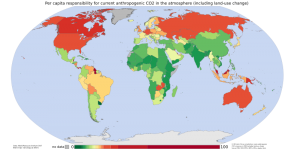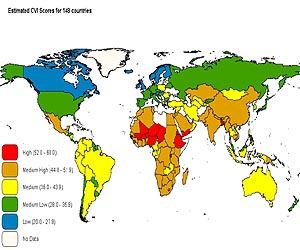Dickinson to Durban » Climate Change » As the Gap Widens
As the Gap Widens
By: Christine Burns ’14
The issues surrounding responsibility for climate change stem from an inequality between developed and developing nations. This inequality makes it difficult for them to see eye to eye, on issues such as responsibility for causing climate change and for fixing climate change.When it comes down to it, it does not matter who is responsible, because everyone is affected by climate change. We can play the blame game, but that is not going to solve anything. Yet, it must be said that developed nations such as the United States and Europe are predominately responsible for the climate change that is starting to be seen now (Bulkeley and Newell). They went through their industrial revolutions 150 years ago during which they relied heavily on fossil fuels, and since then have experience great economic growth, and great increases in emissions. Now, the developing countries such as China and India are going through similar revolutions, and just as the currently developed nations relied on fossil fuels, so do they. So while the developed nations have been emitting longer, it will not be long before the developing nations surpass them as China already has for yearly emissions. This is partly a function of their population size. The world cannot handle per capita emissions equivalent to those of the United States from countries like China, because it has a much larger population.  Bulkeley and Newell also argue that a portion of developing countries’ emissions are a by-product of developed countries out-sourcing their emissions intensive goods, and switching to service based economies. These developing countries are also the countries where deforestation and agriculture are prominent, both of which contribute to emissions. So both developed and developing countries play a part in climate change and both should be part of the solution, yet how big a part of the solution should they be?
Bulkeley and Newell also argue that a portion of developing countries’ emissions are a by-product of developed countries out-sourcing their emissions intensive goods, and switching to service based economies. These developing countries are also the countries where deforestation and agriculture are prominent, both of which contribute to emissions. So both developed and developing countries play a part in climate change and both should be part of the solution, yet how big a part of the solution should they be?
It is difficult to fairly divide up responsibility to nations when there is so much to take into account. First, Bulkeley and Newell discuss the increasing dichotomy between the wealthy nations and the poor that will only get worse with worsening climate conditions. As put by CNN’s Reinier de Graph, “tackling climate change is still a luxury in the developed world.” Yet, climate change will greatly affect the developing world. The developing countries have economies that rely heavily on the environment, and they also do not have the means to simply adapt like the developed world. So what can be done? The heavy emitters will have to take responsibility for their actions. In many cases the countries most affected have contributed the least to the problem. The World Bank has begun to finance projects through the BioCarbon Fund, the Carbon Partnership Facility, and the Umbrella Carbon Facility; but the World Bank cannot do everything. The countries with the means to assist will need to, as they promised to in the UNFCCC. Still there are issues. Bulkeley and Newell address countries like the BRICS countries who believe it is unjust to hurt their economic growth by capping their emissions, while the EU and US were allowed to develop unchecked. This would seem fair except that their emissions are skyrocketing. The developed countries do not want to invest in emissions reductions while countries like China go unchecked. So what is fair? The wealthy developed countries cannot sit back and do nothing while the small island states are washed away. Somehow the developed and the developing nations need to work together to figure out a just solution to climate change and quickly! They need to understand each other’s positions and work to minimize the divide between rich and poor so that all may benefit from a solution.
The World Bank has begun to finance projects through the BioCarbon Fund, the Carbon Partnership Facility, and the Umbrella Carbon Facility; but the World Bank cannot do everything. The countries with the means to assist will need to, as they promised to in the UNFCCC. Still there are issues. Bulkeley and Newell address countries like the BRICS countries who believe it is unjust to hurt their economic growth by capping their emissions, while the EU and US were allowed to develop unchecked. This would seem fair except that their emissions are skyrocketing. The developed countries do not want to invest in emissions reductions while countries like China go unchecked. So what is fair? The wealthy developed countries cannot sit back and do nothing while the small island states are washed away. Somehow the developed and the developing nations need to work together to figure out a just solution to climate change and quickly! They need to understand each other’s positions and work to minimize the divide between rich and poor so that all may benefit from a solution.
Bulkeley, H., and P. Newell, 2010. Governing Climate Change. Routledge, New York.
Reinier de Graff, “Tackling Climate Change Still a Luxury in Developed World,” CNN. 17 August 2011.
Filed under: Climate Change · Tags: Bulkeley and Newell, Christine Burns, climate change, CNN, Developed Countries, Developing Countries, Governing Climate Change, justice, Reinier de Graff








Recent Comments